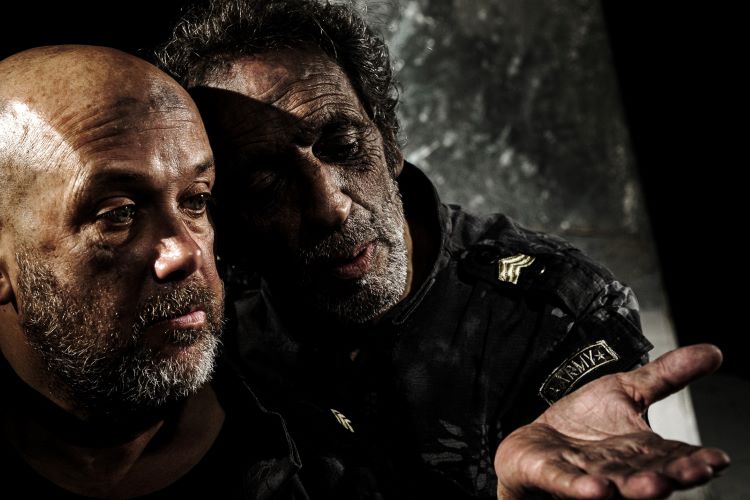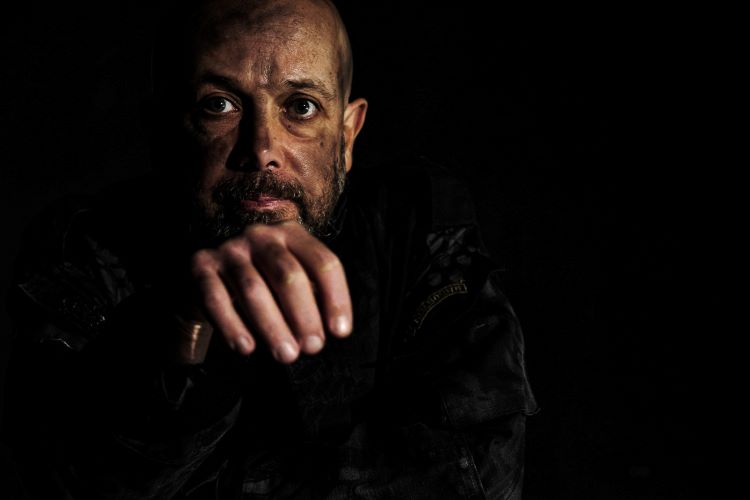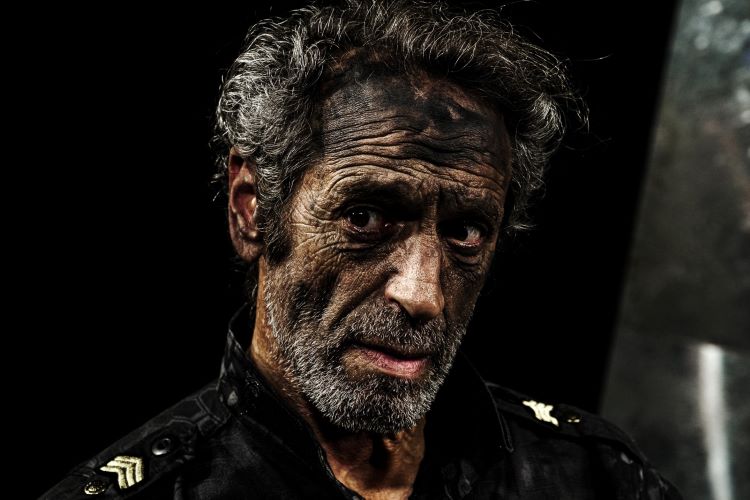
William Shakespeare’s Othello is relentlessly grim and endlessly fascinating, leading its viewers into the darkest abyss, confronting us with humanity’s greatest demonic threat – ourselves. Written over 400 years ago, yet it continues to hold audiences in its grip, remaining as relevant today as it was in the 1600s, its central themes remarkably contemporary: love, jealousy, difference/discrimination, and the status of women. The Malenky Theatre production, produced and directed by Michael Teplitsky, and translated by Dori Parnas, is a tight, pared-down version that emphasizes the play’s significance to modern audiences and enhances its harsh intensity, marked by scintillating, powerful, performances.
Malenky’s Othello is distilled to its most essential elements, the cast limited to the necessary characters. The theatre itself is a black box of small dimensions, creating a setting in which actors and audience share an intimate space, every breath is palpable. The stage set is brilliant in its simplicity: a three-paneled partition is positioned towards the back of the stage, the panels are connected by hinges and can be moved, opened or closed, and most significant, the surface of these panels is a mirror, smudged and blurry, yet capable of reflecting the scene before it. As the audience takes their seats, facing the stage, they see themselves in that mirror.

The play is set in a Venice of the mind, as it opens with an enigmatic figure in a mask, who enters scattering black confetti on the stage, their head crowned by a miniature ship in full sail. The mask is a wonderful metaphor and at the same time, a very practical, efficient way to have actors double up in roles, donning a mask to portray the secondary characters. The mask evokes thoughts of Venice, and more crucially, is a symbolic reference to Iago, the villain of this play, whose every expression is a mask of sorts. In keeping with the image of the mirror, the image of the mask is yet another invitation to consider the performative aspect of everyday life.

Dudu Niv is a fascinating Iago, who makes his first appearance in the play silently, yet visibly resentful, throwing down duffel bags, marking his status as a water carrier rather than a star player. The lovers, Othello (Gil Frank) and Desdemona (Hadas Eyal) appear and tenderly kiss, exchanging sweet words, and the famous handkerchief. All are clad in camo uniforms, marking the play as set in current times. It is interesting to note that Desdemona first appears in uniform, as if she were a soldier – perhaps not equal to Othello in rank, but a colleague as well as a lover, yet in subsequent scenes she appears in a white dress or slip, as if her marriage to Othello now defines her role in life. The casting of this production works excellently. Gil Frank and Dudu Niv make powerful rivals, even though Othello does not realize that Iago conspires against him, Othello is of such strong stature that he makes a formidable foe. Eyal’s youth and beauty stand out even more as paired with Frank’s weathered soldierly looks, and from within that fragile appearance, Eyal brings a verity and strength to her portrayal of Desdemona.
In the intimacy of the theatre, it feels as though Iago is speaking directly to the audience, making us his confidant, as he protests Cassio’s promotion. Niv delivers a mesmerizing performance as the shape-shifting Iago, whose demeanor can change in an instant, manipulating those around him with virtuoso precision, constantly alert and ready to devise any plan to further his desires. Careful to avoid incriminating himself, Iago is rarely explicit in his speech, a master of innuendo who understands the weakness in others and knows how to provoke their reactions through his hints and suggestions. In the entire play Iago makes one honest statement, as he says “I am not what I am.” Although it is clear that Iago is jealous of Cassio (Barak Friedman) who has been chosen as Othello’s second in command, and jealous of Othello for capturing Desdemona’s heart, and perhaps just hating Othello – because he is a Moor, because he is different, or just because, as the play’s plot unfolds Iago appears so consumed by the drive to destroy Othello that his original motivation does not matter anymore, all that remains is the desire to destroy. Even though his machinations have been successful, Iago knows no pleasure. When all has been destroyed – nothing remains.

Teplitsky has given this production a very feminist feel. This can be seen in Gil Frank’s portrayal of Othello, which I feel is very much supported by Shakespeare’s original text, as a man whose definition of love is closely tied to a desire for possession, and whose ego and reputation are more important to him than the breathing, living, woman by his side. In the original text, Othello and Desdemona’s wedding night is interrupted twice, leaving their sexual relationship open to interpretation, Teplitsky interprets this interruption in a particular direction, one that further develops the themes of male and female roles – in the present day, as well as in Shakepeare’s times. Despite his prowess on the battlefield, Othello feels insecure regarding his masculinity, and because he fears appearing vulnerable, he is therefore vulnerable to Iago’s manipulations. In part perhaps because he would sooner trust a fellow man, than reveal his inner fears and feelings to Desdemona, because she is a woman. Yet in Frank’s interpretation of the role, he invites the viewer’s sympathy for Othello, even as one deems him wrong, Frank lets the viewer feel his pain, and one cannot remain unmoved.
Emilia (Ksenia Markuza) is yet another woman trapped in a role that others have defined for her and which she cannot escape. Lady’s maid to Desdemona, whom she loves, she is married to Iago, who treats her miserably, yet she is desperate for any show of affection, and this weakness binds her to his will. Markuza accomplishes this balancing act with flair, delivering a complex portrayal of a woman whose situation in life creates an internal conflict, a woman with desires that remain unfulfilled, an intelligent woman who understands that she is being used, yet cannot escape, perhaps even hoping that this time, or next time, things will get better. Barak Friedman is exactly right as the young, straight-edge Cassio, sincere and well-intentioned to the end.
Othello is an extremely intense play dealing with very primal emotions and the intimacy of the Malenky Theatre and this production magnifies this intensity. My one comment on an otherwise excellent production is that at times, both in the portrayal of Iago and that of Othello, the performance reached too high an emotional pitch, which I felt, achieved the opposite effect of distancing the audience from the character. Othello is most moving when he speaks quietly, his restraint revealing the depth of turmoil and sorrow within. Iago is at his most seductive and fascinating when he is light and glib, or serenely sincere – that is when we forget for a moment that he is a horrific person, and we catch ourselves admiring the villain. The most piercing lines, both of Othello and Iago, are those delivered in an almost conversational tone. All this comes to an incredibly effective climax in the play’s final moments, working beautifully with Shakespeare’s play on “light” – in several ways, through speech, lighting, movement, and silence. The most powerful aspect of this production is in the way all its elements work together to evoke a sense of complicity in the audience, the feeling that however horrific what we have just seen onstage, we are the ones who have allowed this to happen. In this mirror we see a vision of ourselves.
Othello
By William Shakespeare
Translated by Dori Parnas
Produced and Directed by Michael Teplitsky
Stage Design: Alexander Lisiyansky; Lighting Design: Misha Chernyavsky and Ina Malkin; Costume Design: Yehudit Aharon; Assistant Director: Julia Goland; Original Score: Eugene Levitas; Cast: Gil Frank (Othello), Dudu Niv (Iago), Hadas Eyal (Desdemona), Barak Friedman (Cassio; Brabantio), Ksenia Markuza (Emilia, The Duke of Venice)





